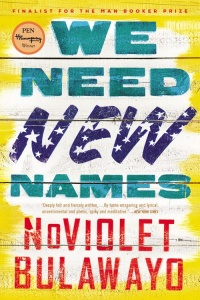 “We are living at a time when the world is becoming smaller – throw a stone in a crowded place and you will hit a couple of people who come from somewhere, who are removed from their homelands for one reason or another. I wanted the novel to mirror this reality, which is why it eventually crosses the border into the US, where Darling ends up. And of course America is its own hive of inspiration. One of the stories I care about, perhaps from living in this space, is the immigrant story, specifically how hard it can be, and the necessity of talking about it – especially as it affects the young, whose voices often go unheard. I wanted Darling to have a voice and be relevant.” – NoViolet Bulawayo, Interview with The Guardian, November 15th, 2013
“We are living at a time when the world is becoming smaller – throw a stone in a crowded place and you will hit a couple of people who come from somewhere, who are removed from their homelands for one reason or another. I wanted the novel to mirror this reality, which is why it eventually crosses the border into the US, where Darling ends up. And of course America is its own hive of inspiration. One of the stories I care about, perhaps from living in this space, is the immigrant story, specifically how hard it can be, and the necessity of talking about it – especially as it affects the young, whose voices often go unheard. I wanted Darling to have a voice and be relevant.” – NoViolet Bulawayo, Interview with The Guardian, November 15th, 2013
We Need New Names was met with mixed reviews when it was published in 2013. It was a finalist for the Man Booker Prize, but many reader reviews found it lackluster and average. Released in the midst of controversy over the DREAM Act and the whisperings of reforming other immigration policies, I think it is an important book to read.
The novel tracks the coming of age of Darling, a native Zimbabwean who travels to the U.S. to live with her Aunt Fostalina in her early teenage years. The New York Times review identifies Darling’s time in Zimbabwe as “a study in contrasts” and highlights it as the strong point of the story. The first half of the novel is indeed alive with an energy that is not captured in the second half of the novel, partly because of the cultural aspects and partly because I’m sure it was Bulawayo’s intention to show Darling’s shift into adulthood, U.S. culture, and cynicism.
I personally enjoyed the latter half of the book and found it very real and textured in its detailed abstraction of life in the U.S. It is worth noting that this is the first book I have read that incorporates modern technology in a way that doesn’t feel contrived and out-of-sync. It was very much set in the 21st century with references to texting, Facebook, and widely available porn.
There are the two forces of Bulawayo’s writing that keep me coming back to it’s pages, searching for moments written in a language that struck a chord. They seem to work in opposition to each other, but in many ways parallel the many other oppositional forces that drive the immigrant experience.
- The synchronization of two very different cultures, peoples, and languages. As she writes in the author interview in the back of my version of the novel, “…my English gets its pulse from my intimacy with another language. My process allows me to hit notes that I would otherwise struggle with, and the story gains texture. There is value in juggling these two languages and making them work together – where one is lacking, the other compensates.” Bulawayo is able to not only identify the experience of one person, but really an entire conglomerate – an entire group of people – and keep the voice of the singular and the collective working in tandem.
- The way in which Bulawayo express’ the clashing of these two cultures (Zimbabwean and American). As Darling tells the white, college girl whose parents house she cleans and whose diary she has read, “Miss I Want to Be Sexy, there is this: You have a fridge bloated with food so no matter how much you starve yourself, you’ll never know real hunger. Look around you, and you have all these riches that you don’t even need; upstairs your bed is fit for a king; you go to Cornell, where you can be anything you want; you don’t even have to clean up after yourself because I’m doing it for you, right now; you have a dog whose wardrobe I couldn’t afford; and what’s more, you’re here, living in your own country of birth, so just exactly what is your real problem?”
Overall Score: 10. A great read that is going to be added to the list of books I recommend consistently.
